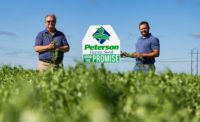A new variety of high oleic soybeans, SOYLEIC, will soon be grown in Illinois. Developed in Missouri through research made possible by soybean farmers, SOYLEIC is the result of years of conventional soybean breeding, making it a non-GMO choice. From field to table, SOYLEIC is a functional, sustainable way to eliminate trans fats and provide healthier oil.
“SOYLEIC non-GMO high oleic soybeans are an exciting opportunity for Illinois soybean farmers,” said Linda Kull, director of Ag Innovations for the Illinois Soybean Association. “The new varieties could help farmers improve their bottom line through value-added markets while also meeting the food industry’s need for high performing soybean oil.”
The versatility and neutral taste of soybean oil made it one of the most popular vegetable oils used in food around the world. With bans and regulations around trans fats and partially hydrogenated oils, the introduction of high oleic soybean oil is a welcomed addition to the food industry. High oleic technology, such as SOYLEIC, is an advancement in the soybean market that gives soybean oil greater potential for high temperature and prolonged uses like baking, frying and sautéing in both commercial and home kitchens. Soybean oil with high oleic acid content can be used at high temperatures without hydrogenation or producing trans fats.
Soybean oil from SOYLEIC soybeans offers the functionality and performance that soy oil is known for, but with a high oleic fat profile that naturally eliminates trans fats. High oleic soybean oil is a high-stability oil, providing a neutral flavor profile and extended shelf life. Its ability to be used at high temperatures results in lower oil absorption making it an ideal oil for frying. Additionally, SOYLEIC has a longer fry life, allowing longer times between oil changes and reducing waste oil.
“In addition to health benefits, consumers are increasingly looking for sustainably-produced foods. SOYLEIC, like all soybeans, is grown with advancing sustainability practices by American farmers,” said Rachel Peabody, director of communications for the Illinois Soybean Association. “We’re excited that Illinois soybean farmers have the opportunity to grow SOYLEIC while still incorporating numerous sustainability practices.”
In fact, in the past 40 years, soybean farmers have reduced the energy it takes to raise a bushel of soybeans by 35 percent. American soybean farmers are using tools like precision agriculture to apply fertilizer only where it is needed; they are increasing soil health by minimizing tillage and adding organic matter to their fields; and farmers are increasing the biodiversity on their farms by incorporating protected acres for wildlife and native plants.
To learn more about SOYLEIC, visit www.soyleic.com.
For more information about Soy from Illinois, visit www.ilsoy.org.





-(2).jpg?height=200&t=1631140111&width=200)



